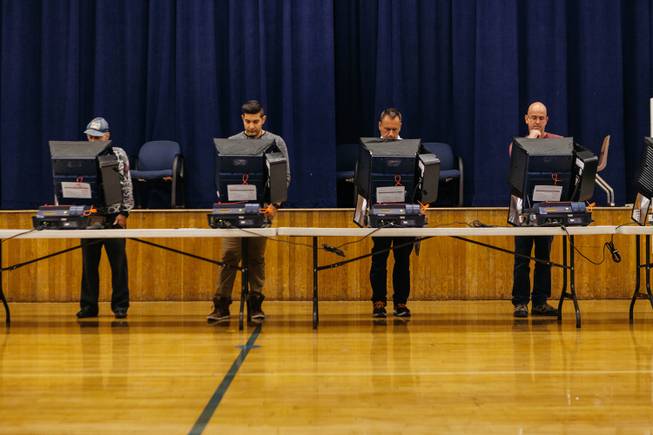
Votes take to the polls on election day at the John C. Fremont Middle School polling station in Las Vegas, Nev. on Nov. 8, 2016.
Wednesday, March 22, 2017 | 2 a.m.
Lawmakers are considering legislation to make Nevada the 12th state to become part of an interstate compact to elect the president and vice president based on the popular vote.
The compact says that once states with 270 electoral college votes sign on, those electors would be required to vote based on the popular vote for president and vice president.
Assemblyman Nelson Araujo, D-Las Vegas, sponsored Assembly Bill 274 and said during a legislative operations and elections committee hearing Tuesday that, if passed, the state would retain the ability to leave the compact.
Opponents who spoke at the hearing were concerned about the loss of Nevada’s political relevance nationally, possible lawsuits over the constitutionality of the compact, as well as potential issues with implementing the compact should enough states sign on.
Supporters, including representatives of nonprofit organization National Popular Vote project, said this compact would make every vote count while retaining the electoral college.
The ACLU of Nevada is among the supporters of the measure. Several representatives of political groups, including the Libertarian and Republican parties, spoke against it.
Kevin Powers, committee counsel for the Legislative Counsel Bureau Legal Division, said several constitutional matters should be considered if the compact goes into effect.
He said state legislatures have the right to decide how they determine which electors will vote for the president on behalf of the state. It’s unclear whether those electors are able to use guidance from outside the state, such as the popular vote, in deciding how to vote.
Powers said the Compact Clause of the Constitution says states need congressional approval for interstate compacts but that they can enter these agreements and pursue that consent later if needed. He said the U.S. Supreme Court decided this applies only when these agreements increase the power of the states at the expense of federal supremacy.
Testimony was wide-ranging in a hearing that lasted about two and a half hours. Three members of the committee had to be excused to attend a transportation committee work session.
“When I first presented the bill,” Araujo said, “I mentioned that my goal was to have a healthy dialogue around what the best course for our state should be, and I think that we had that today.”

Join the Discussion:
Check this out for a full explanation of our conversion to the LiveFyre commenting system and instructions on how to sign up for an account.
Full comments policy